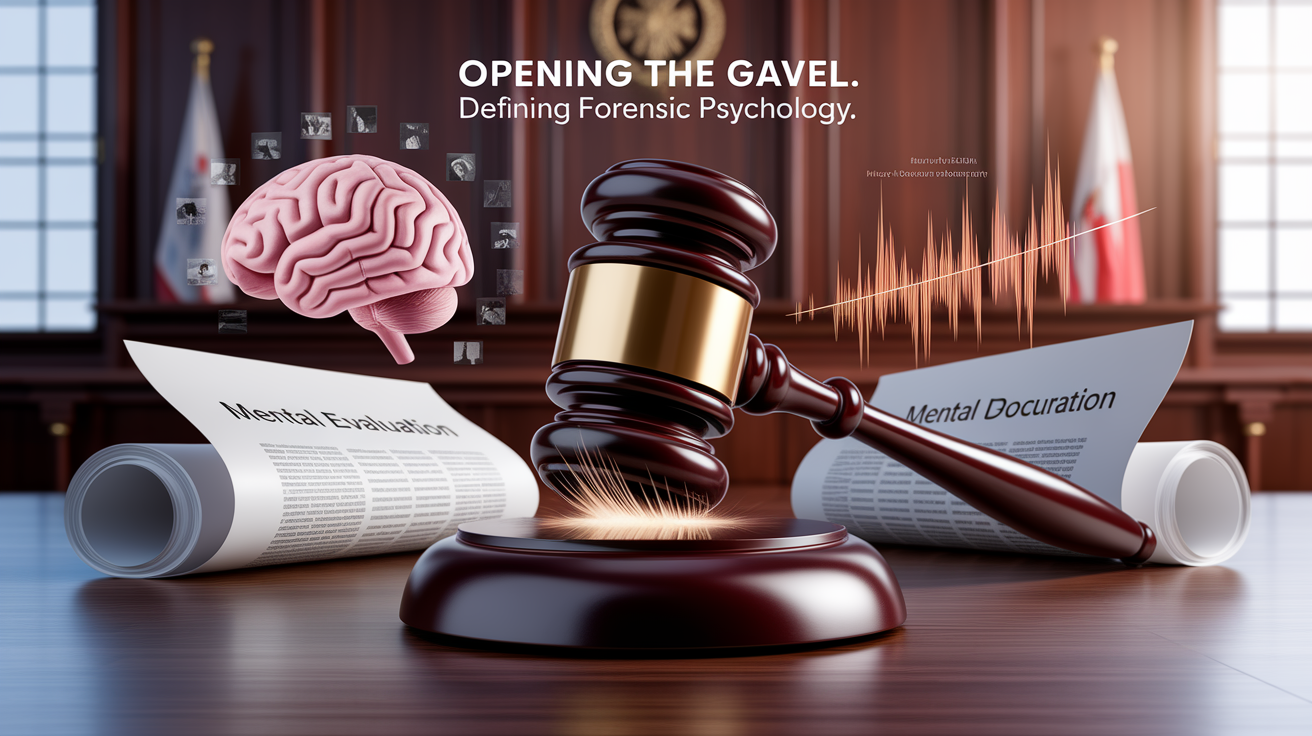Mind Meets Justice: A Concise Guide to Forensic Psychology
Opening the Gavel: Defining Forensic Psychology
At the intersection of psychology and the law lies the compelling and critical field of forensic psychology. Far more than the dramatized criminal profiling seen on television, this discipline represents the rigorous application of psychological science to legal questions, processes, and proceedings. According to the American Psychological Association, the term “forensic” originates from the Latin word “forensis,” meaning “of the forum”—a reference to the ancient Roman courts where public debates and legal matters were decided. Today, it signifies the professional practice by psychologists within the criminal and civil justice systems.

The scope of forensic psychology can be understood through two lenses:
- A Narrow Definition: This view focuses primarily on the application of clinical psychology to the legal field. It includes the assessment, diagnosis, and treatment of individuals who are involved with the legal system, such as performing a psychiatric evaluation on a defendant or providing therapy within a correctional facility.
- A Broad Definition: This more encompassing perspective includes the application of research and principles from various subfields of psychology—such as cognitive, social, and developmental psychology—to legal matters. This might involve studying the reliability of eyewitness testimony or advising on jury selection strategies.
In essence, a forensic psychologist uses their expertise in fundamental human behavior and mental processes to provide objective, data-driven insights that help a court of law arrive at a just conclusion.
Behind the Scenes: Core Functions and Case Types
The role of a forensic psychologist is diverse, extending far beyond the courtroom witness stand. They perform a variety of crucial functions within both the criminal justice system and civil litigation, always aiming to bridge the gap between mental health and legal standards.
Criminal Proceedings
In criminal law, a forensic psychologist’s work is often centered on the defendant’s state of mind. Key responsibilities include:
- Competency Evaluations: One of the most common roles is assessing a defendant’s competency to stand trial. This involves determining if an individual has a rational and factual understanding of the legal proceedings against them and can assist their attorney in their own defense.
- Sanity Evaluations (Insanity Defense): Psychologists may be called upon to evaluate a defendant’s mental state at the time of the alleged offense. This assessment is central to the insanity defense, which argues a defendant is not criminally responsible for their actions due to a severe mental disease or defect.
- Risk Assessment: This function involves evaluating an individual’s likelihood of re-offending (recidivism). These assessments inform decisions related to sentencing, parole, and the management of offenders in correctional facilities. The process often relies on validated psychometric assessment tools to ensure accuracy and objectivity.
- Offender Profiling and Behavioral Analysis: While a smaller part of the field than media suggests, some specialists work with law enforcement to analyze crime scene evidence and develop a psychological profile of an unknown suspect. This area is more accurately termed behavioral analysis.
Civil Litigation
Forensic psychology also plays a significant role in non-criminal cases, where psychological harm or capacity is a central question.

- Child Custody Evaluations: In contentious divorce and custody battles, a forensic psychologist evaluates the parents, children, and family dynamics to recommend a custody arrangement that serves the child’s best interests.
- Personal Injury Cases: These professionals may assess the psychological impact (e.g., PTSD, depression, anxiety) of an accident or injury to help the court determine damages. Understanding the science of emotional psychology is vital in quantifying such impacts.
- Worker’s Compensation Claims: Similar to personal injury cases, a psychologist might evaluate an individual’s claim of psychological harm or stress resulting from their work environment.
Expert Witness and Consultation
In all these areas, a primary function is serving as an expert witness. A forensic psychologist provides courtroom testimony to explain complex psychological concepts, present assessment findings, and offer a professional opinion. They also consult with attorneys on trial strategy, jury selection, and the psychological aspects of a case.
Skills that Shape the Forensic Psychologist
A career in forensic psychology demands a unique blend of clinical acumen, legal knowledge, and personal resilience. It’s not enough to be a skilled psychologist; one must also navigate the adversarial and high-stakes environment of the legal system. The most effective forensic psychologists possess a robust skill set.

- Critical Thinking and Objectivity: The legal system requires clear, objective, and evidence-based opinions. A forensic psychologist must be able to analyze complex information from multiple sources, maintain neutrality, and avoid bias.
- Strong Communication Skills: These professionals must effectively communicate complex psychological findings to non-psychologists, including judges, attorneys, and juries. This involves clear writing for detailed reports and articulate verbal skills for courtroom testimony.
- Clinical Assessment and Diagnostic Skills: A deep understanding of psychological assessment, diagnostic tools, and interview techniques is foundational. This expertise is crucial for everything from sanity evaluations to risk assessments.
- Legal Knowledge: A firm grasp of mental health law, legal standards, and courtroom procedures is non-negotiable. This ensures their work is relevant and admissible in court.
- Ethical Fortitude: Navigating the ethical dilemmas in forensic psychology cases—such as balancing client confidentiality with court mandates—requires a strong ethical compass and a thorough understanding of professional guidelines.
How to Become a Forensic Psychologist
The path to becoming a forensic psychologist is academically rigorous. Typically, it requires a doctoral degree in psychology (a Ph.D. or Psy.D.) with a specialization in forensic psychology. This is followed by a postdoctoral fellowship for supervised experience and, finally, state licensure to practice. While some master’s-level positions exist, particularly in correctional settings, the role of an expert witness and independent practitioner requires a doctorate.
Where the Mind Works: Career Settings and Outlook
Forensic psychologists are employed in a wide array of environments, reflecting the broad scope of the field. Many are self-employed in private practice, offering evaluation and consultation services to attorneys and the courts. Others work within the system itself.

Common work settings include:
- Correctional facilities and prisons, designing and implementing rehabilitation programs.
- State forensic hospitals, providing treatment for individuals deemed incompetent to stand trial or not guilty by reason of insanity.
- Law enforcement agencies (police psychology), assisting with officer screening, training, and wellness.
- University and research institutions, advancing the science of legal psychology.
- Government agencies, such as the FBI or military.
The career outlook is strong. The specialized expertise of forensic psychologists is in high demand within the legal arena. According to recent data, their compensation reflects this specialization; as of May 2023, the median annual salary ranged from approximately $117,690 to $131,220, depending on the employment sector and geographic location.
Closing Arguments: The Impact and Future of Forensic Psychology
Forensic psychology serves as a vital bridge, ensuring that decisions within the justice system are informed by a scientific understanding of human behavior. By providing objective assessments of competency, risk, and mental state, these professionals help protect the rights of vulnerable individuals and contribute to public safety. Their work in designing treatment programs also plays a crucial role in rehabilitation, aiming to reduce recidivism. Incorporating a deep understanding of principles of trauma-informed care and effective counseling principles and applications is essential for creating programs that genuinely help offenders reintegrate into society.

The future of the field will likely see continued growth, with expanding roles in areas like cybercrime psychology, terrorism risk assessment, and refinements in understanding eyewitness memory. As our understanding of the brain and behavior evolves, so too will the contribution of forensic psychology, ensuring that justice is not only blind but also psychologically informed.







